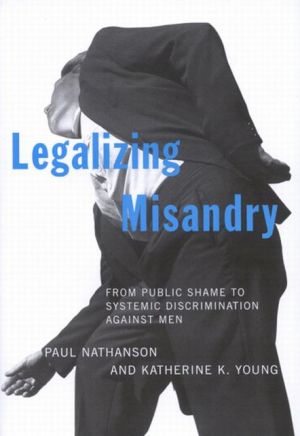

 |

|

The average rating for Legalizing Misandry: From Public Shame to Systemic Discrimination Against Men based on 2 reviews is 3.5 stars.
Review # 1 was written on 2010-12-02 00:00:00 Marck Binette Marck BinetteThe simple facts that my public library couldn't locate a single copy for me to borrow [!] on interlibrary loan AND the fact that I almost died from a DVT/PE while climbing the steps to the local women's college to check their collection/borrowing-privileges should tell you enough! Get it. Read it. |
Review # 2 was written on 2021-01-25 00:00:00 Shawna Charbonneau Shawna CharbonneauFrom the book: By now, our legal systems are based firmly on double standards. No matter how liberal, no matter how complacent, men who end up in court over conflicts with women soon discover these double standards not only in connection with custody and child support but also in connection with accusations of domestic violence and even in the reversal of such basic legal principles as the presumption that they are innocent unless proven guilty. Discrimination against men is by now so pervasively institutionalized that it is best described as systemic and characteristic of the legal system as a whole. Here, then, is the connection between the attitudes generated by misandry in popular culture and their institutionalization in policy and law. * That brings us, in chapter 11, to the metaphor of revolution. This has been a "quiet revolution" and thus both less costly and more effective than most of the noisy ones that end up in bloody streets and coups d'états. The doctrines of ideological feminism have been introduced so quickly, so cleverly, and so subtly that most citizens - including most lawyers and legislators - have not even recognized what has been happening. And most of those who have are quickly silenced by a reign of terror uniquely suited to the needs of a quiet revolution: that of political (and sexual) correctness. Bear in mind that what follows is about the moral and philosophical implications of law, not law per se. Even though this or that ruling can be legitimated by legal precedent or legal analogy, for instance, it cannot necessarily be legitimated morally or philosophically. Lawyers, judges, and even legislators more and more often ground their opinions, interpretations, or reinterpretations, either directly or indirectly, on questionable ideological principles. And feminist ideologues (some of whom happen to be lawyers, judges, or legislators) have done precisely the same thing by arguing that the fundamental premises of legal theory must be reexamined in view of their own theories or even epistemologies. In fact, it is precisely the attempt to legalize and bureaucratize - and thus institutionalize - feminist epistemologies that constitutes the essence of what we call a quiet revolution. * |
CAN'T FIND WHAT YOU'RE LOOKING FOR? CLICK HERE!!!